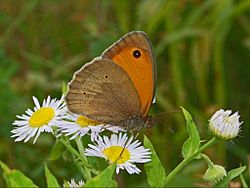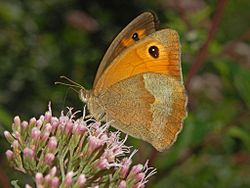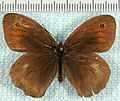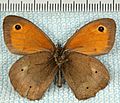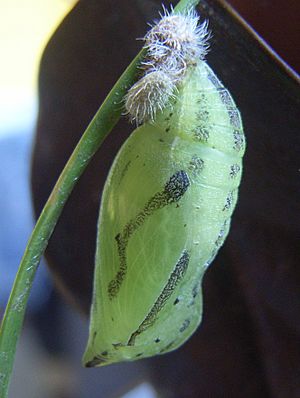Meadow brown facts for kids
Quick facts for kids Meadow brown |
|
|---|---|
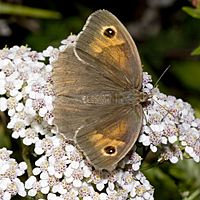 |
|
| Female | |
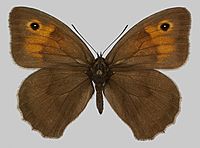 |
|
| Mounted on a card | |
| Scientific classification | |
| Kingdom: | |
| Phylum: | |
| Class: | |
| Order: | |
| Family: | |
| Genus: |
Maniola
|
| Binomial name | |
| Maniola jurtina (Linnaeus, 1758)
|
|
The meadow brown, Maniola jurtina, is a butterfly found in European meadows, where its larvae feed on grasses.
There is some sexual dimorphism in this species. Males are less colourful, with smaller eyespots and much reduced orange areas on the upper forewings. They are also much more active and range far about, while females fly less and often may not away from the area where they grew up.
The evolutionary significance of the upperwing eyespots is probably attack deflection. Small, peripherally located eyespots act as attractors to deflect the attacks of predators to non-vital parts of the body.
Food plants
- Sheep's fescue Festuca ovina
- Rough meadow grass Poa trivialis
- Smooth meadow grass Poa pratensis
Description of egg, larva and pupa
The egg, laid on a blade of grass as shown (Plate 85), is upright and ribbed; the top is flattened, with an impressed ring thereon. Color, whitish green inclining to brownish yellow as it matures, and marked with purplish brown. The caterpillar is bright green, clothed with short whitish hairs; there is a darker line down the back, and a diffused white stripe on each side above the reddish spiracles; the anal points are white. Head rather darker green, hairy. The chrysalis is pale green, marked with brownish on the wing covers, the thorax is spotted with blackish, and the points on the body are brownish. Suspended, and with the old skin attached.
Images for kids
See also
 In Spanish: Maniola jurtina para niños
In Spanish: Maniola jurtina para niños


